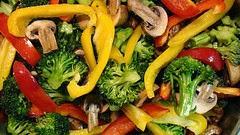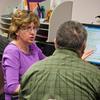
Photo by David Saddler.
I am the parent of teens, and I find myself asking them daily, "Eat your vegetables."When did I become so matronly?
I better understand the value of produce now that I've reached midlife. I have read enough from evidenced-based research studies to see the science backing up produce as a vital element of one's diet. And I continue to read emerging research.
I also visit several skilled nursing homes in my city where I see people suffering the affects of diseases that are correlated to lifestyle choices in some (but not all) cases: heart disease, high blood pressure, diabetes and some forms of cancer.
And I have a very clear memory of a moment spent in the produce section of my local grocery store.
About five years ago, I was rushing in to get items for dinner when I crossed paths with a man near the root vegetables. He dressed in the clothes of a laborer, on the younger side of midlife, thin, and weather worn. He was by himself, looking sad and lost.
He turned to me--probably because I was looking matronly that day--and asked, "How do I cook and eat these vegetables?"
I picked up a sweet potato and described its benefits and how it can be cooked and eaten in a couple of fairly simple ways. He stopped me mid-sentence and told me,
"I have cancer. My doctor told me that I need to eat better. But I don't know how to eat vegetables. I've been eating fast foods and frozen meals my whole adult life. I'm totally lost."I wanted to adopt him, take him home, and teach him basic principles of good nutrition and basics about cooking vegetables.
In addition to feeling heartache for him, I felt gratitude for my mother. She was raised on a farm, and her mother kept a big kitchen garden. My mom later studied home economics in college. Almost every day of my childhood, my mother explained the benefits of good nutrition, and she taught me how to select vegetables and cook them.
I also felt gratitude for my public education and college classes, which included instruction on exercise and nutrition. I also felt gratitude for my church. While attending additional meetings during the week or on Saturday, I received education as a child, teen and adult woman on the importance of keeping to a dietary code and instruction on provident living, including learning how to buy and prepare foods that are affordable as well as nutritious.
Now that I'm older, I can see the hours and hours and hours of instruction I received from a number of venues. Knowing this enormity of the task of teaching this man left me a bit paralyzed. I didn't mean to be sexist, but I did wonder to myself, "Where are his women folk?" Or at least, "Where are friends and family members willing to cook for him while they least teach him how to cook for himself?"
I remember wanting to direct him to resources, and I mumbled something to him about churches and about the local extension office. However, I felt that my gesture was grossly inadequate.
Even though I am not a professionally trained dietitian, this experience motivates me to eat better myself and to do what I can to educate people around me--especially young people. They have so much future ahead of them. If they can establish good habits at a young age, they have a greater chance of securing good health over their lifetime.
This "preach the word" tone of mine reminds me of an older gentleman who stopped me and my son by the meat counter earlier this year. He stopped my son and told him, "Make healthy choices, young man!" Then poised and confident man slumped a little as he told us about a half dozen friends his age with serious health challenges. He was preaching the gospel of good nutrition, right there in the grocery store, as a way to express his sorry for his lifelong friends.
So to honor this mature gentleman's friends and in memory of the sad man in the produce section, I will at minimum eat a large portion of raw leafy greens today.
Related:
Nutrition for Our Age
Health Benefits of Sardines
Protein Intake for Older Adults

